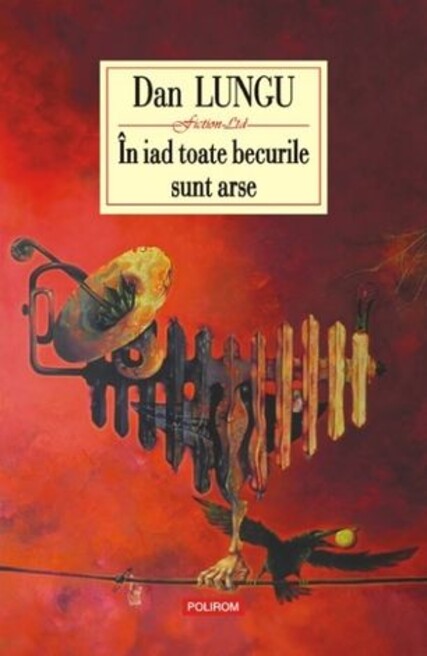Dan Lungu
Bereich: Literatur
Key Facts
Nationalität
RumänienBereich
LiteraturWohnort
IasiEmpfehlende Institution
BMeiAZeitraum
Dezember 2011 - März 2012Graduate of the Philosophy Faculty, Sociology-Political Studies Section, 1995, „Al. I. Cuza“ University;
Post-doctoral studies at the Sorbonne, 2005-2006, Paris V
Published books:
- Cum să uiţi o femeie / How to Forget a Woman(novel),(novel) , Polirom: Jassy, 2009
- Sînt o babă communistă / I’m a Communist Biddy (novel), Polirom: Jassy, 2007 (currently being adapted for the big screen; director – Stere Gulea, screenwriter – Lucian Dan Teodorovici)
- Băieti de gască / Good Guys (short prose), Polirom: Jassy, 2005
- Raiul găinilor (fals roman de zvonuri si mistere) / Hens’ Heaven: Faux Novel of Rumours and Mysteries, Polirom: Jassy, 2004
- Constructia identitătii într-o societate totalitară. O cercetare sociologică asupra scriitorilor / The Construction of Identity in a Totalitarian Society: A Sociological Investigation into Writers, Junimea: Jassy, 2004
- Nuntă la parter / Ground Floor Wedding (plays), Versus: Jassy, 2003
- Proză cu amănuntul / Retail Prose (short prose) Cronica: Jassy, 2003; Polirom: Jassy, 2008
Artistic and cultural experience:
· 2009 - Public reading in Jerusalem Book Fair, Leipzig Book Fair, Torino Book Fair, Berlin (Literaturwerkstatt), Leipzig (Café Puschkin), Thessaloniki Book Faire, Casablanca (Hassan II University), Rabat (High School Rene Descartes and French Cultural Institute), Tübingen (Tübinger Bücherfest), Freiburg (Kino Alter Bahnhof Wiehre), Madrid (Circulo de Bellas Artes), Vienna (Hauptbücherei am Gürtel), Istanbul (Galatasaray University), Düsseldorf (Orangerie Schloss Benrath). Participant at Vilenica International Literary Festival and Istanbul Tanpınar Literature Festival
· 2008 - Public reading in Berlin (Literarische Colloquium), Graz Literaturhaus, Budapest Book Fair, Barcelona Book Fair, Stuttgart Volksuniversiteit. Participant at Cognac Literary Festival, Sete Literary Festival, Caen Literary Festival (Insolite Roumanie)
· 2007 -Writer in residence at the Marguerite Yourcenar Villa, France. Public reading in Vienna (Volkstheater), Lofer, Paris (Maison d’Europe et d’Orient and the Romanian Cultural Institute), Zurich Literaturhaus, Basel Book Fair, Leipzig Book Fair, Vienna Romanian Cultural Institute
· 2006 –Invited by the Romanian Cultural Institute in Vienna, in partnership with KulturKontakt, to take part in the Niederoesterreich Book Week in Wiener Neustadt
· 2005 –Participant in the Les Belles Etrangeres Roumanie events held in Paris, 14-26 November 2005 (along with writers Gabriela Adamesteanu, Stefan Agopian, Ana Blandiana, Mircea Cărtărescu, Gheorghe Crăciun, Letitia Ilea, Ion Muresan, Marta Petreu, Simona Popescu, Cecilia Stefanescu, and Vlad Zografi)
· 2004 – Writer in residence, Vienna, July-August, with a grant provided by KulturKontakt, Austria; public readings at the Romanian Cultural Centre in Vienna
· 2001–2003 - Chairman of the public readings organised by Club 8 in collaboration with the Goethe Zentrum, Jassy
· 2001 – 2002 - Editor-in-chief of Timpul cultural magazine
· 2001 –Invited to give public readings at the Literaturhaus (Salzburg) and the Alteschmide (Vienna)
· 1998 –Participant at Pontes-98, Meeting of Young European Writers (Krk, Croatia)
· 1997 – 2000 - Collaborating editor on Monitorul de Iasi newspaper, responsible for the Arts Page
· 1996 – Founder of Club-8
· 1995 – 1997 –Editor of the Children’s Page of Sotron magazine, Botoşani
The project I’ve chosen to embark upon during my two-month residence is my current work in progress, a novel I’ve only just started writing. It explores the topic of post-communist European migration seen from a child’s unsullied perspective. A ten-year old girl is left behind in Romania, in the care of her grandparents, as her parents go abroad in search of work. Her feelings and imagination help bring into focus a world seen from below, a strange world whose dramas are hard to sense for grownups. It is a world both lit by the sun of naiveté and dissected by the child’s inexorable logic. The parents’ rash departure wreaks havoc with the little protagonist’s formerly safe world, forcing her to try her very best in order to cobble up, out of whatever comes her way, a new world she can inhabit. As this new world comes into being, we can witness the reconstruction of family values, of friendship and of the identity of the new generation in a ruptured society where emigration can’t be defined as either good or bad –more often than not, it is the only solution.
